By leaps and bounds: A history of Chester’s Maple Avenue School
Chester. This timeline follows the growth spurts that gave rise to a new school on Maple Avenue in the 1930s, a new wing in the 1960s, a new elementary school in the 1970s, and a new middle school and high school in the early 2000s. BOCES, which had occupied the Maple Avenue building for the past 15 years, is now gone, leaving the building without an immediate purpose and its fate up to the voters in a Feb. 25 referendum.
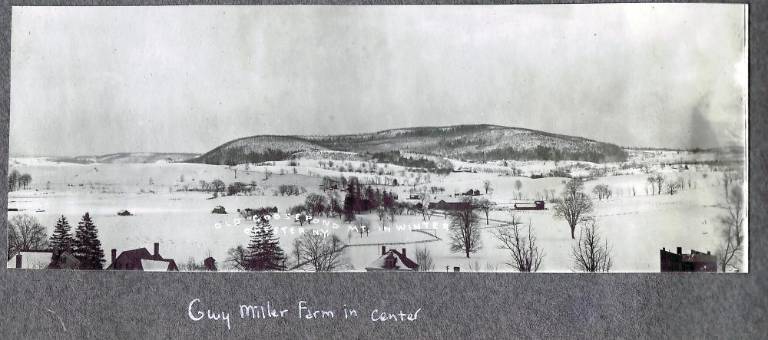
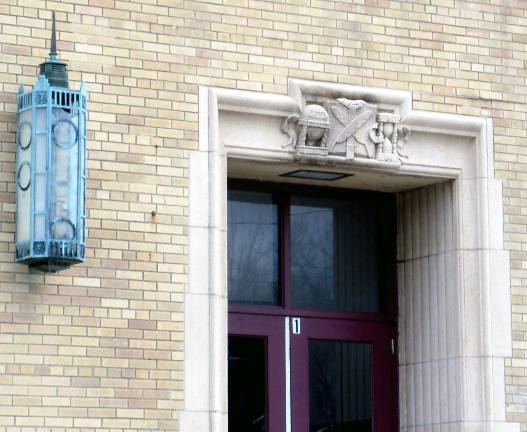
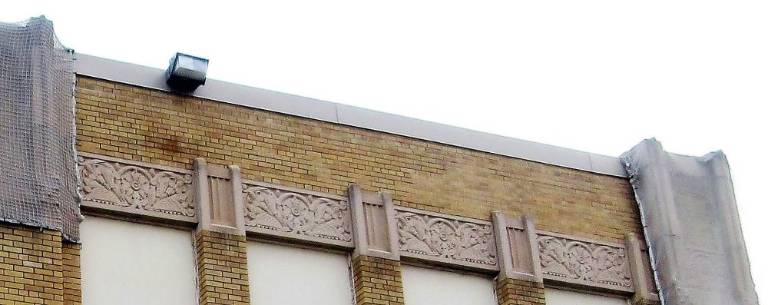
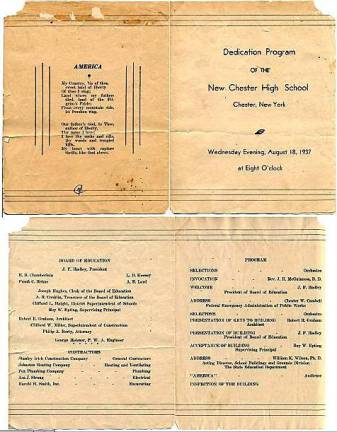

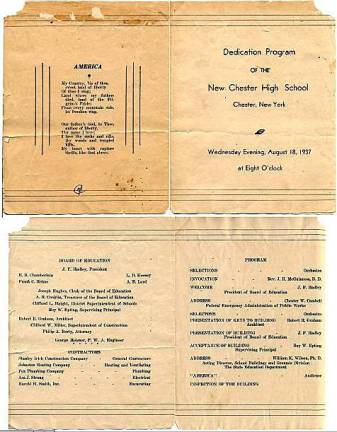
It had happened before and would happen again: as Chester grew, its citizens had to decide how it would accommodate a growing student body.
1934: Plans for a new school
On June 19, 1934, a committee of 12 met with the board of education. They had obtained a federal grant from the Public Works Administration (part of the New Deal to help the country recover from the Great Depression) and a bond from Goshen Savings Bank for new construction.
Middletown architect Robert R. Graham studied two options: build an annex to the “school on the hill" on Oakland Avenue, or build an entirely new school. On Dec. 27 the board decided to build a new school on “the Miller site,” the property formerly belonging to Guy Miller, who trained the famous trotter Hambletonian 10.
1935: Construction begins
On March 21, 1935, Graham gave the school board the good news that Albany had approved their plans. Construction started that year.
1937: Dedication and first graduation
In June 1937, the new school held its first graduation ceremony. “Although they had completed their studies at the Oakland Avenue School, eighteen proud and accomplished students received their diplomas at the new facility," reported The Chester News.
A dedication ceremony for the Maple Avenue School was held in August (see sidebar for the dedication program), and daily classes began in September. An entrance plaque notes that the building was erected in 1936 with assistance from the Federal Emergency Administration of Public Works, Project No. N.Y.-1204-R. The school principal was Roy W. Epting. Clifford W. Miller was the construction superintendent, and G. Stanley Irish was the builder.
The building is in the Art Deco style and exhibits the vertical lines and geometric patterns popular at the time. The lantern outside the front door is a fine example of the style. The front door entrance was used for faculty and senior students only.
Over the front door is a sculpted representation of a globe, a book with crossed quill pens in front, and an hourglass. The building is made of yellow brick with sculptural elements in cast stone (concrete) made to resemble sandstone. A checkerboard design and floral motif bands run around the top. The building has a clock tower topped by a copper cupola bell tower and a finial on top of that.
1960s: More growth
A growing student population once again strains the available space. Some students took classes in rented church halls and at the American Legion Hall, where the CVS pharmacy is now (the site was previously occupied by the Golden Palace Restaurant and, from 1842 to 1906, the original Chester Academy).
1964: Annex is approved
An addition to the Maple Avenue School was approved in March 1964.
1965: Annex is dedicated
The new wing, dedicated on Oct. 30, 1965, contained ten classrooms, a gym, an industrial arts room, a home economics room, a science lab, and a library. High school classes were held in the annex, while the original building was used for the elementary grades.
An outbuilding was also constructed in 1965. According to the current Chester superintendent of schools, Denis Petrilak, it houses a gymnasium that is still in use and will continue as a gym.
1974: Chester gets a new elementary school
A growing student population again makes new construction necessary. An elementary school was built on Herbert Drive and dedicated on June 9, 1974. Students in kindergarten through grade 6 moved into the new school, while the Maple Avenue School became the Junior-Senior High School for grades 7 to 12.
2003: The last class graduates from Maple Avenue
Thirty years a new middle school and high school was in the works to accommodate continued growth.The Class of 2003 was the last to graduate from the school on Maple Avenue.
2004: The Chester Academy opens
A new middle school/high school went up on the former Tuthill property on Hambletonian Avenue. It was named the Chester Academy in honor of the original 1842 Chester Academy School.
The school on Maple Avenue stood empty until Orange-Ulster BOCES leased it for an alternative middle school. A Jan. 20, 2005, article in The Chronicle states that in the fall of 2004, “The Chester Union Free School District and Orange-Ulster BOCES agreed to a five-year lease of the building on Maple Avenue with a provision for five more years if both parties agree....BOCES will pay the district $25,000 each year for use of the 66,528-square-foot building.”
Under the agreement, BOCES was to renovate the building at its own expense and maintain most of it. The Chester school district was to continue using the gym and athletic fields in the back of the building and maintain them throughout the term of the lease.
2020: Proposal to raze the school
Superintendent Denis Petrilak said BOCES left before the lease ran its course, and that the Maple Avenue building has stood empty since then. He said repairs would cost $4 million and that the only viable option is to raze the building and construct a field house and multi-sport athletic field in its place for $7.9 million.Voters in the Chester Union Free School District will decide whether to accept this proposal in a bond referendum to be held on Tuesday, Feb. 25.
The original Maple Avenue School is eligible for the National Register on several counts. It is architecturally significant because it is the only example of an Art Deco building in the village. It is more than 50 years old and is significant to many people in the community.
Editor's note: Most of the historical information above came from alumni who contributed to the 1985 Chester High School Yearbook and the "1892-1992 Village of Chester Centennial Journal." Other information was provided by The Chester Historical Society and the Chester Public Library and several Maple Avenue graduates and members of the Chester Alumni Association.